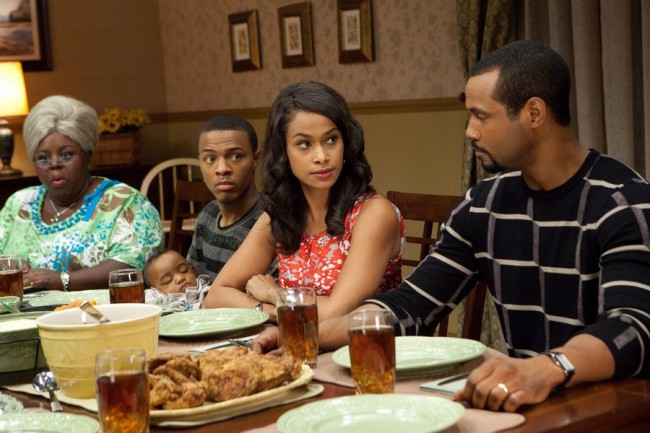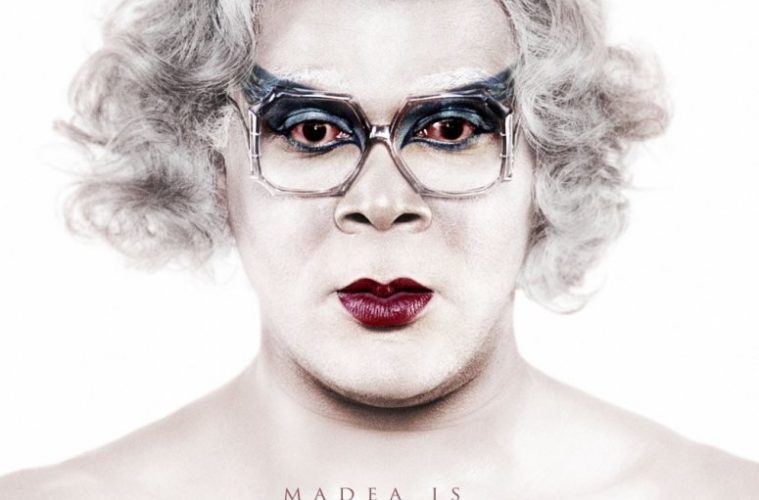
I’ve been closely following the Tyler Perry phenomenon, before the film adaptation of Diary of a Mad Black Women. His signature character Madea has achieved a following in off Broadway theatre. Perry has a classic rags to riches tale making work for a market considered under-served by Hollywood, he was smart enough to gain control of his material, owning his own Atlanta-based production company. You should know this, because this is part of the problem. In an academic paper I’d include a footnote referencing Wiseau, Tommy.
Unchecked by a studio system who may want and attempt to make Madea play across a broader audience. Full disclosure: this film appeals to two things I am not, black and female, of which we can have a long debate over the notion of “qualification.” The problem is Madea, although the peace maker is someone who may be considered “human” for having “multiple dimensions” – her first appearance has her attack a stuck up ghetto fab fast food employee. Madea is bipolar, unlicensed and is allegedly the lovable aunt who once did go to jail (see the better but still flawed Madea Goes to Jail).
The Madea universe from film to film aren’t exactly interlocked, the comparison to Madea and The Muppets can inevitably be made: a new ensemble with similar problems form around her – Perry continually takes on drug dealing, domestic violence, rape, money issues, etc etc. He has been evolving as a filmmaker, not quite reaching success apart from his excellent and underrated Daddy’s Little Girls. He had been reaching towards perfecting a blend of theatre and cinema, even edging towards the experimental with his unsuccessful adaptation of For Colored Girls. This one is a major step backwards in his evolution as a filmmaker He’s dusted off an old script of his, dealing with themes he’s already conquered to what end? Well he’s selling movie tickets.
Consider the ending of his Why Did I Get Married Too?, where pulls off something so emotionally brilliant and unexpected. I was in awe as in five minutes he took the audience from laughing, to being in shock, to laughing again, to crying, and then hits us with “what the hell is Dwayne “The Rock” Johnson doing here?”. It should be seen with a large audience for this reason alone.
Madea’s Big Happy Family, which is false advertising because everyone in this film is miserable, should not be seen. The heart of the film is Shirley (Loretta Devine), women of considerable faith, whose doctor delivers the news that her cancer has returned. She’s joined by Aunt Bam (Cassi Davis), who is a pot smoker signaling what should be outrage from Nancy Myers on her R-rating for It’s Complicated.
The family itself is disjointed, including Shirly’s three “children” (a third act revelation warrants the quotes) – the perpetually angry real estate agent with a great husband, Tammy (Shannon Kane), the more stable Tammy (Natalie Desselle-Reid) and Byron (Shad “Bow Wow” Moss), an 18-year old with an infant son, a high maintenance girlfriend and an obnoxious baby-momma who calls him out on the Maury Povich show.
There have been great films made about miserable realistic people: I always go back to Mike Leigh’s brilliant Another Year. Madea is no Jim Broadbent. The Tyler Perry formula, in this case adapting his own stage work, here is lazy. The performances also feel for the most part theatrical. I’ve always contended on stage Madea may have worked, but this suffers from the flaws of the inexcusably awful Diary of a Mad Black Women. I was baffled by Madea (played by Perry himself) who goes so far over the top in a film that mixed tones so recklessly, as if to give the middle finger to someone like Leigh who does it effortlessly and with restraint. As a result Leigh’s films, made at a much slower pace than Perry’s, are masterful.
Since 2006 Perry has written and directed ten films, five were Madea branded films, of which I believe Madea Goes to Jail was the best. Perry has mastered melodrama with the Family that Preys, a good film about class structure and the charming Daddy’s Little Girls (his best film). I had hope that he was on the verge of a major break through and think it still may come; Madea is a beloved character for a reason. You’d never know it until the last act of this disjointed, unfunny and insipid mess.


